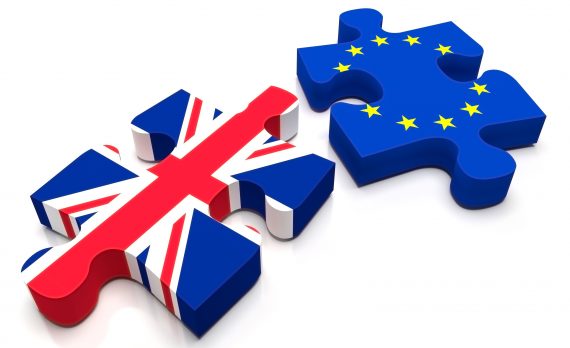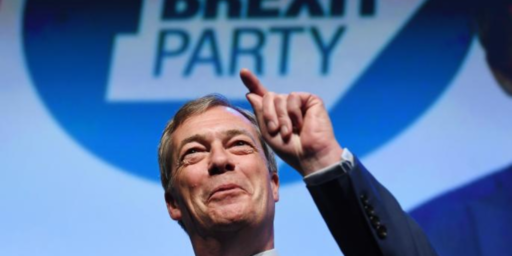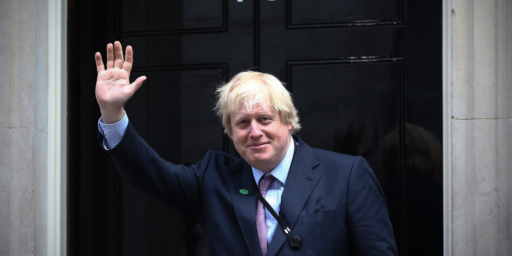British Prime Minister Theresa May Aiming For A ‘Hard Brexit’
British Prime Minister Theresa May made it clear that she intends to move forward with Brexit.
British Prime Minister Theresa May delivered a long-awaited speech about the United Kingdom’s exit from the European Union:
LONDON — In a speech that could define Britain’s relations with its neighbors for decades to come, Prime Minister Theresa May on Tuesday charted a course toward a clean break with the European Union, calling for the country to abandon the single market after more than four decades of integration with the Continent
Mrs. May emphasized Britain’s determination to regain control of migration from the European Union and rejected the supremacy of the European Court of Justice, even at the risk of losing unfettered access to the single market, but she also said she wanted to procure tariff-free trade with the bloc and to keep parts of its customs union.
The long-awaited speech was a shift for Mrs. May, who had dropped heavy hints about her thinking but had refused to outline publicly how Britain would leave the bloc after voters supported a withdrawal in a June referendum.
After months of stressing that there was no “binary divide” over Britain’s membership of the single market, she explicitly ruled out staying a member, arguing that it was impossible for a Britain that controlled its borders and set all of its laws.
“Let me be clear,” she said, adding that any agreement would be sent to both houses of Parliament for approval, “What I am proposing cannot mean remaining in the single market.”
The speech appealed for a new relationship with Continental Europe, with Mrs. May saying she wanted “a new and equal partnership — between an independent, self-governing, global Britain and our friends and allies in the E.U.”
“Not partial membership of the European Union, associate membership of the European Union, or anything that leaves us half-in, half-out,” she added. “We do not seek to adopt a model already enjoyed by other countries. We do not seek to hold on to bits of membership as we leave.”
Nevertheless, she warned that if Britain were locked out of European markets, it would feel free to cut corporate taxes and change its economic model to remain competitive.
Mrs. May’s intervention represents an opening gambit in a hugely complex negotiation. “The United Kingdom is leaving the European Union,” she said. “My job is to get the right deal for Britain as we do.”
Reaction from opponents of a British departure from the bloc — commonly known as Brexit — was swift and harsh. “Theresa May has confirmed Britain is heading for a hard Brexit,” said Tim Farron, the leader of the centrist Liberal Democrats. “She claimed people voted to leave the single market. They didn’t. She has made the choice to do massive damage to the British economy.”
Jeremy Corbyn, the leader of the Labour Party, focused on the Conservative Party promise to cut corporate taxes to attract businesses, on the Irish model, which the chancellor of the Exchequer, Philip Hammond, proposed on Sunday.
“Theresa May has made clear that she is determined to use Brexit to turn Britain into a bargain-basement tax haven on the shores of Europe,” Mr. Corbyn said. “She makes out this is a negotiating threat to the 27 E.U. countries, but it’s actually a threat to the British people’s jobs, services and living standards.”
The response from European leaders was more muted. Frank-Walter Steinmeier, the German foreign minister, welcomed the fact that Mrs. May “finally has given a little more clarity over the British plans,” and he called on the 27 other member countries to unite to preserve the single market.
Even before the speech, Mr. Farron had accused Mrs. May of taking Britain toward “a destructive, hard Brexit,” with consequences that “will be felt by millions of people through higher prices, greater instability and rising fuel costs.”
His party pointed on Tuesday to the impact of the slump in the value of the pound, which helped push up inflation in December to 1.6 percent, its highest rate since July 2014.
While currency markets had been jittery in recent days in anticipation of the speech, the pound rallied by as much as 1.5 percent after Mrs. May began talking, suggesting her remarks — leaked to British news outlets over the weekend — had already been accounted for.
Mrs. May’s speech, delivered in the grand surroundings of Lancaster House in London, was the most closely watched statement on European policy since January 2013, when the prime minister at the time, David Cameron, promised to hold a referendum on European Union membership.
Given the fact that the referendum supporting Britain’s exit from the European Union took place seven months ago, there’s been some speculation about just how committed May and her fellow Tories were to the idea of committing to a full-fledged exit from accords that have defined European politics for several decades now. Part of the reason for this may have been due to the fact that, like her predecessor David Cameron, May was a public supporter of the ‘Remain’ side of the debate as were both of the opposition parties, the Labour Party and the Liberal Democrats. Indeed, some polling that has taken place in the wake of the June 23rd vote has suggested that the British public itself has had at least some second thoughts about the idea of leaving the E.U. and what it might mean for their nation’s economic future, its relationship with its neighbors, and their own lives. At the very least, the speech would seem to confirm, though, that May remains committed to the promise that Cameron made that the government would abide by the outcome of the referendum regardless of which way it turned out. All of this means that, absent some kind of political earthquake in Great Britain in the coming months, one that would likely have to result in new elections, the nation will be moving forward with its exit from the European Union, and that the future of the E.U. itself will be thrown into further doubt as some of the same nationalist forces that led to the surprising victory for the ‘Leave’ forces look likely to play a role in elections in France and Germany later this year.
May’s speech also appears to answer questions that were hanging over the Brexit process itself, but the answer creates questions all its own. Based on some initial comments from government officials in London over the past several months, there was some question about what kind of exit could be anticipated. Since being part of the common European market has obvious economic benefits for the United Kingdom, for example, there was some suggestion that what we’d see in terms of a ‘Brexit’ would be an arrangement that ended Great Britain’s formal membership in the European Union but maintains its status in the common market itself. The opposing position, sometimes referred to as the “hard Brexit,” would mean that the U.K. would end up having to renegotiate its trade and other economic relationship with the rest of Europe all over again. May’s speech seems to make clear that she intends to take a hardline position in negotiations and that the status of future agreements between the E.U. and a Great Britain outside of Europe would have to be the subject of negotiations effectively separate from the negotiations regard separation from the European Union. Obviously, this makes the task of negotiating all of these deals far more difficult than a softer approach would involve.
May also said in her speech that she intends to stick to previous promises to begin the process of leaving the European Union by the end of March, nearly a year after the June referendum. By some estimates, the process itself will take at least two years, and probably longer than that. In addition to the financial and trade issues that will need to be dealt with, negotiators will also have to deal with issues ranging from the status and rights of Britsh ex-pats living in Europe who have become used to moving from place to place with minimal trouble, the status of other diplomatic relationships, and the myriad of taxation and tariff issues that will be implicated by the change. It’s also unclear just what kind of impact all of this will have on the United Kingdom as a whole. Proponents of the ‘Leave’ side of the argument have claimed in the months since June that the doomsayers who predicted economic trouble for the nation if Brexit won have been proven wrong by the fact that the British pound has become stronger and British stock markets have been generally moving up over the past seven months. It strikes me, though, that it’s far too early to judge the consequences of Brexit on Britain or Europe. For one thing, it’s hard to judge anything given the fact that the Brexit process itself hasn’t even started yet so it is is far too premature for either side to claim victory in the argument over what the consequences of Brexit will ultimately be. At the very least, that evaluation needs to wait until the process of withdrawal is well under way, and even then it likely won’t be until well after it’s actually complete that we’ll know for sure what the consequences of and exit will be for the British people. Indeed, it’s entirely possible that voters will ultimately come to regret what happened on June 23rd, 2016. By then, of course, it will likely be too late to change course.






Doug–I’ve been following the whole Brexit bruhaha and I think that it’s going to end up much more painful than the Brexiters think.
Their present applause for the situation reminds me of someone who jumps off a 50-floor building and claims, as he passes the 25th floor “everything is going GREAT!”
@grumpy realist:
Similar to Obamacare and “Repeal and Replace”.
I was under the impression that that pound has lost quite a bit of value since the Brexit vote
http://www.cbc.ca/news/business/british-pound-brexit-1.3937381
Does Mr. Hammond know Mr. Brownback of Kansas.
(At least Brownback didn’t try to attract corporations from other states while banning their employees from moving to Kansas.)
@David M: Oh, the Brexiters are claiming that just makes it easier to sell UK products abroad.
The fact that the drop in the pound has increased UK inflation is of course totally ignored…..
Brexit is as hard to understand as Trump. The U.K. was able to avoid adopting the Euro, so they were getting all the benefits of the EU, without the downside. At least Trump is currently term limited out of office, Brexit is permanent. The U.K. is purposely choosing a future with less freedom, less prosperity and less opportunity.
@David M: It’s the “Little Englanders” getting miffed about “Johnny Foreigner” again.
Our dreamers want to go back to 1950. Theirs want to go back to 1850.
Britain makes a ton of money in the financial services industry. A lot more than in manufacturing. There is a few EU nations who would just love to take that over.
so i forget now, is brexit “racist/sexist/misogynist”? and wtf should we care, it’s their country and they should run it the way they want as long as it doesn’t mess with our interests!
the usual wankers that get offended on cue by their messiahs but rarely have a clue about what they protest about. it’s like the 2 that hit close to home for me, both involved guns. the first was when Texas approved “open carry” statewide, the 2nd was when the university system approved concealed carry on campus. the leftists were frothing at the mouth, out of their minds about it (more than usual). the result….nothing happened. granted, it’s only been a year for the “open carry” and 4 month for the “campus carry” but still- nothing.
the reason why is you have to be a “legal” gun owner with a chl…..that eliminates the usual losers who shoot at each other for fun/profit. i know, it’s “racist” too…….
The problem within the UK is immigration. The rest of the EU is not going to allow any deal with the UK without freedom of movement, that´s why Theresa May is going for a hard brexit. That´s more important than the Financial Industry or anything else for her.
No chance of that. Right now, Corbyn, in one of the most predictable developments in politics, is driving Labour right into the abyss.
@bill:
Kudos. This is an extraordinary insight. The way to better understand Brexit is to focus on gun control in Texas. I could never have been imaginative enough to come up with that logic by myself.
@NW-Steve: I live in Texas and I can’t figure what his point is.
Tories who oppose Brexit will drive some of their supporters to the UKIP.
Britain is a first-past-the-post system. A split in the conservative vote would help Labour and the Lib Dems to add seats, probably giving them sufficient numbers to form the next government (i.e. choose the prime minister.)
So ultimately, this is about putting party before country. Americans should be accustomed to this sort of thing.
@bill:
Two, things, bill:
1) You’re absolutely right, Brexit is totally about your personal gun fetish.
2) This is a site you will find helpful: http://www.mentalhealthamerica.net/finding-therapy
@Matt: chronic whining over nothing- you’re welcome.
@bill:
In an economic system as globalized as this one is, the above is a difficult trick to master, but if you know the secret, please forward your resume to jo**@st***.gov.
@bill:
WA! Gawd I wish that were true, but I will advise State not to look for your resume to be forthcoming.
@bill:
You guys are still waxing nostalgically about the good old days of “racist/sexist/misogynist” behavior? Get over it.
On point though: I’m not quite sure what it is that you have against free trade, Bill.
A few points about free trade: (1) In fact, it has generally weakened labor unions, which among White conservatives is considered to be a good thing; (2) It’s resulted in lower prices for many goods, generally a good thing for most people, liberal and conservatives alike; and (3) it’s led to an overall increase in the standard of living for hundreds of millions of people, both here and abroad, again, thought to be a very good thing by most people (that is, except the current conservative movement.)
Please explain it?
Good article analyzing what the Brexit vote was really about.
I was right when I said the Brexiters want to go back to 1850….
Oh LORD…it’s been reported that some Brexiters want to pull out of the European Patent Office and WIPO and the Paris treaty and….
Venezuela redux. Out of WIPO? That’s out of the PCT and the Madrid Protocol. Which means no one is going to apply for a patent in the U.K. Unless they’re damn sure there’s a market there.